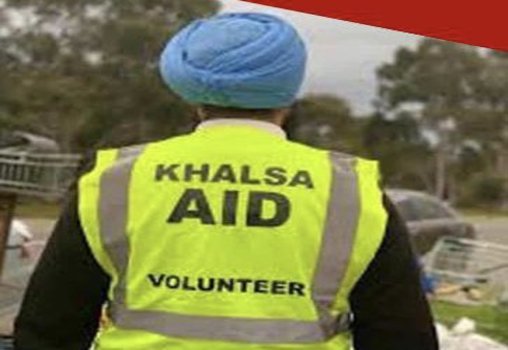Khalsa Aid was founded in 1999 by Ravinder (Ravi) Singh Ji. It’s a UK-based international non-profit humanitarian organization that provides support to victims of natural disasters around the world like famines, earthquakes, and war. Khalsa aid is a super social activist. Their team provides suitable shelter, distributes food, clothing, medical facilities, and other requirements.
How Did It Originate?
During Kosovan refugees, Ravi Singh Ji was inspired by Sikhi ideology which is ‘sarbat da bhala(well being of all)’, which inspired him towards humanity and reaching out in the corners of the world to help the people, regardless of their religion, race, and borders.

Since 1999, Khalsa Aid has been involved in many relief efforts around the world.
After reading the news of refugees struggling to cross the cold and mountainous border so that they can reach safe and peaceful Albania. He read about small groups who were organizing aid to transport to Albania. Then, he called the group from the newspaper and asked them to deliver aid contributed by the Sikh community who had been extremely bountiful in providing food and money, and within two weeks, two trucks and a van loaded with aid headed off to Albania.
This is how Khalsa Aid was born.
Aid Between 1999 To 2004
In August 1999, there was a destructive earthquake in North-Western Turkey, it killed thousands of people and resulted in huge damage to property and life. The earthquake measured was 7.9 on the Richter scale. It was estimated that 17127 were killed and 43953 injured. Over 120000 houses were damaged.
Khalsa aid provided thousands of pairs of socks and water purification tablets. These items were sent to the offices of Turkish Red Crescent in Istanbul via Turkish Airlines and were distributed to sufferers.
In October 1999, Orissa suffered a destructive cyclone, which killed over 30,000 people. The team of Khalsa aid provided humanitarian aid.
After spending days they decided to help children with educational supplies. They purchased educational material for over 6000 children.
On 26 January 2001, a devastating earthquake trembled Gujarat killing thousands of people and destroying almost all buildings in the region. Khalsa aid took 50,000 water purification tablets and it was first distributed to camps. After observing the condition they decided to purchase large tents which were supplied through trucks in Gurdwara in Gandhidham near Bhuj. With the help of local Sikhs, Khalsa distributed tents to each family. The remaining funds were used to hire water tankers for providing nearby villages with clean water.
In January 2002, a volcanic eruption caused a lot of destruction to the people of Goma, Rwanda. The eruption was 35km away from the city of Goma but the hot lava destroyed everything.
Khalsa aid provided water purification tablets and essential medical supplies. They faced some difficulties because of armed conflict in the area. But despite these difficulties, they managed to help over 1000 people.
In July 2003, Khalsa aid was contacted by local NGOs to provide relief to minority communities
In Afghanistan. Khalsa aid provided support to the Kabul Sikh and Hindu communities by purchasing educational items, three personal computers, and financial support for running a local primary school in the region.
In 2003, Khalsa aid flew to Somalia to provide relief. The elderly villagers informed them about illnesses caused due to polluted water. They needed help with an alternative source of clean water in the village. The team met WFP agents who identified the need for clean water. Khalsa aid distributed a large supply of water to the locals and also required medical relief for people suffering from illnesses.
In 2004 December, an undersea earthquake took place off the coast of the Tsunami Islands.
At the epicenter of the west coast of Sumantra, the earthquake led to a series of tsunamis, killing more than 225000 people in many countries.
Khalsa aid provided relief through a ship containing tons of flour, lentils, salt, and onions along with hundreds of mosquito nets and mosquito repellents.
Economic aid was also given to people who lost their livelihoods.
Their service is never-ending and they will continue to serve humanity.
